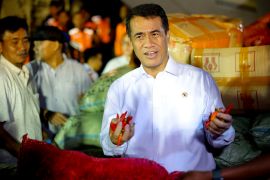"The minister wants the people to be aware of the spread of these viruses, especially during Hajj season," Deputy Minister for Health, Population and Family Planning Tubagus Rachmat Sentika said here on Tuesday.
Rachmat noted that the government is currently taking various measures in anticipation of the risk of MERS-CoV and Ebola spread in Indonesia. Among the policies implemented by the government are warning Indonesians wishing to travel abroad and tightening visa application process for people traveling from countries with Ebola outbreak.
The government has also activated early detection and fast-response mechanism in hospitals, community health centers, and laboratories.
The World Health Organization (WHO) was quoted by Reuters as saying on Friday (Aug 8) that West Africas Ebola epidemic is an "extraordinary event" and presently constitutes an international health risk.
The Geneva-based UN health agency claimed that the possible consequences of a further international spread of the outbreak, which has killed almost one thousand people in four West African countries, were "particularly serious" in view of the virulent nature of the virus.
"A coordinated international response is deemed essential to stop and reverse the international spread of Ebola," the WHO noted in a statement after a two-day emergency committee meeting on Ebola.
According to the ministry, Ebola can be transmitted from animals to humans and among human beings through direct contact.
A person who has contracted the Ebola virus suffers from high fever, fatigue, muscle pain, headache, vomiting, and dysfunctional lungs and kidneys.
The WHO and the European medical centers have also been urging people to avoid traveling to infected areas or being in contact with people carrying the Ebola virus.
Reported by Wuryanti Puspitasari
Translated and Edited by Amie Fenia Arimbi
EDITED BY INE/a014
Editor: Aditia Maruli Radja
Copyright © ANTARA 2014











